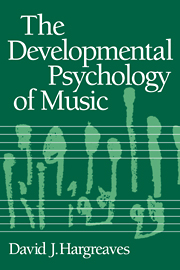Book contents
- Frontmatter
- Contents
- Preface
- 1 The developmental psychology of music
- 2 Children's thinking and musical development
- 3 Musical development in the preschooler
- 4 Musical development in the schoolchild
- 5 Development of responses to music
- 6 Creativity, personality, and musical development
- 7 Social psychology and musical development
- 8 Developmental psychology and music education
- References
- Author Index
- Subject Index
2 - Children's thinking and musical development
Published online by Cambridge University Press: 27 August 2009
- Frontmatter
- Contents
- Preface
- 1 The developmental psychology of music
- 2 Children's thinking and musical development
- 3 Musical development in the preschooler
- 4 Musical development in the schoolchild
- 5 Development of responses to music
- 6 Creativity, personality, and musical development
- 7 Social psychology and musical development
- 8 Developmental psychology and music education
- References
- Author Index
- Subject Index
Summary
Some psychologists would argue that if we can understand how children think, we can probably understand most other aspects of their behaviour. This is the basis of the ‘cognitive-developmental’ approach; and the figure largely responsible for its predominance in today's child psychology has been Jean Piaget. A good deal of contemporary research on musical development is rooted in theories of children's thinking: Piaget's theory is by far the most influential of these, and I shall consequently devote the main body of this chapter to it.
We start with an outline of the basic concepts of genetic epistemology, that is, of Piaget's developmental psychology, and very briefly outline his account of developmental stages. Most relevant to musical development are the second and third of these: and so we look next at symbolic development in the second, pre-operational stage. In particular, studies of symbolic play and drawing throw a good deal of light on parallel musical developments. The transition into the third, concrete operational stage has probably received more research attention than any other aspect of Piagetian theory: and we look at this in terms of the acquisition of conservation. Research on ‘music conservation’ is of particular interest to us here, and I question and evaluate the validity of this Piagetian analogy.
- Type
- Chapter
- Information
- The Developmental Psychology of Music , pp. 31 - 59Publisher: Cambridge University PressPrint publication year: 1986



